My Favorite Free Tools For Writers
my favorite free tools for writers
hello, hello! hope you're doing well.
today i am bringing you another list with my top 3 favorite (free!) tools that I find helpful for each phase of writing a novel.
brainstorming phase
Fantasy Names Generator - not only for fantasy (you can also generate real names). this website is just... amazing! it helps you come up with names for characters, places and locations, descriptions, generate traits, outfits (yes, outfits!!), and probably something else you could ever think of.
The Story's Hack - this one is so cool! you can generate names for everything, create your own generator, and practice writing through writing exercises! plus, you can save your generated names to see later, and you earn coins for each idea generated (you can later buy themes - dark, snow, forest, etc)
RanGen - my last favorite generator on this list is RanGen! you can generate plots, appearances, archetypes, love interests, cities, worlds, items, and more.
developing the idea phase
Bryn Donovan - in this blog you can find master lists under the tag "master lists for writers". it is so helpful when you first start developing the characters and need to find the right words to describe them and to find some quirks and flaws!
Writers Write (350 character traits) - again, this is so helpful!
Story Planner - ah, the number of times I've talked about this website... please, PLEASE take a look at it, you won't regret it. this website has literally everything you need to fully develop your idea with outlines for you to fill in step by step.
writing phase
Colleen Houck (80+ barriers to love) - need more romace conflict? there you go!
Cheat Sheets for Writing Body Language - so, you know how your character's feeling, but don't know how he'd physically act? check out this list!
Describing Words - honestly, this is a lifesaver. don't you struggle to find the right word to describe something? well, with this website all you have to do is to type the object you're trying to describe and see which description fits better to you!
revising phase
Language Tool for Google Docs - i know we all have heard about google docs before, but the truth is, it's almost impossible to find free softwares to check grammar and spelling. so, google docs is useful, because it automatically revises it for us, and it's completely free. plus, you can add adds-on, such as "language tool".
Unfortunately, there's only one (free) tool that I actually enjoy for the revising phase. if you know some others, please let me know so that I can try them out and feature in this list.
exporting phase
Google Docs - i find google docs very easy to format and export to .epub, so i'd recommend using it as a free tool.
Reedsy - this is also a free tool available online. all you have to do is to write down each chapter (copy and paste) or import your word document. it will format the document to your liking and export it to pdf, epub and mobi.
that's everything for now! i hope this post was somehow helpful or inspiring!
if you want to see more master lists full of resources, check these:
WEBSITES FOR WRITERS {masterpost}
BEST accounts to follow as a writer
BEST SITES & SOFTWARES TO WRITE FICTION
DIALOGUE IDEAS TO GET RID OF THAT WRITING BLOCK (masterpost)
Useful Resources & Tips for Writers
also, if you are a notion lover just like me, check the free template I just released with everything you need to develop and write your novel!
thank you so much for reading! hope to see you around, and have a nice day <3
More Posts from Lune-versatile and Others
Controlling Your Pacing
Pacing is one of my favourite things to pay attention to when reading or writing something. The pacing of a scene is literally how ‘fast’ or ‘slow’ a scene appears to be moving. Action scenes that spring the story from one place to another tend to go faster than introspective scenes or scenes that explore character dynamics.
All of this is created through putting space and words between elements of the scene. What I mean by that is that readers interpret a passage of time between ‘things’ (actions, dialogue, gestures, etc.) on the page, and pacing is controlling that interpretation.
For example,
“Georgia sat on the couch, “wow it sure is hot in here,” she said. “It sure is,” Henry agreed, sitting next to her.”
This sentence is just about the actions with some breaking dialogue, but it goes pretty quickly through what’s happening.
Whereas, if we were to intentionally pace this scene, it may look like this:
“Georgia swiped at her brow, wandering over to sink into the couch. “It sure is hot in here,” she said, peering up at Henry through the wisps of her bangs. He nodded weakly, his entire body sagging from the heat. Crossing the room to collapse next to her, he added dryly, “it sure is.”
It’s not perfect, but you can get a sense of the time between things happening. The added detail between the two characters talking conveys maybe a minute between sentences, which might be accurate for two people dogged down by a heat wave.
To speed things up, we want less space between elements:
“Adam slammed open the door with his shoulder, letting it bounce off the concrete wall behind him. “Everyone out!” He shouted. A crack in the roof snapped above them.”
The added (or subtracted) elements of a scene that control your pacing is the sights/sounds/feelings/smells/maybe tastes of a place. When we’re anxiously rushing to get out of the house we may not acknowledge that the kitchen smells like the bread our roommate baked that morning, or that there are smudges on the window from when the dog climbed up on the couch. However, when we have a second to contemplate, we’re going to notice these things, and it would be appropriate to write them in.
Another important element to controlling pacing is your character’s thoughts or acknowledgement of feelings.
For example:
“Adam slammed open the door with his shoulder, it bounced off the concrete wall behind him. He winced, his mother’s high voice ringing in his head, chiding him for damaging the walls even though he knew the building was coming down on top of them. How long would he live with her constantly in his mind? He tried to wave away the memory. “Everyone out!” He shouted.”
That slows down the scene quite a bit, yeah? And maybe that’s what you wanted in that moment. Play around with the details and pacing in your scenes, you might be surprised how much can change.
Good luck!
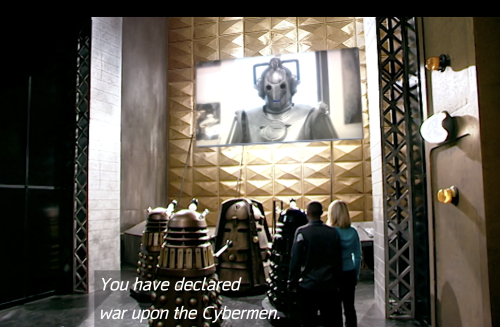


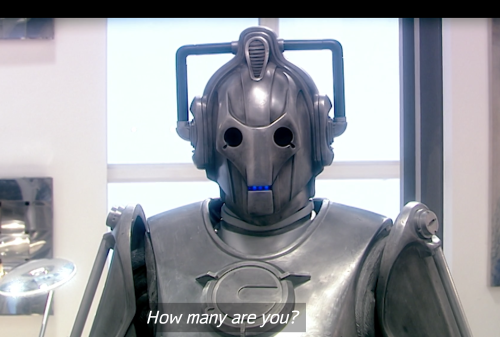

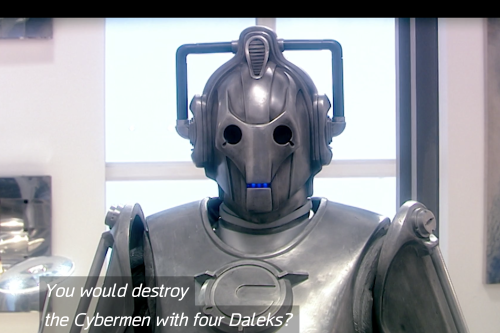
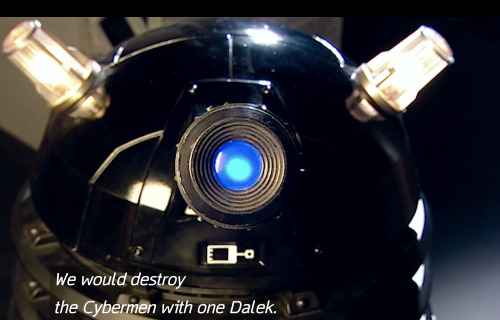
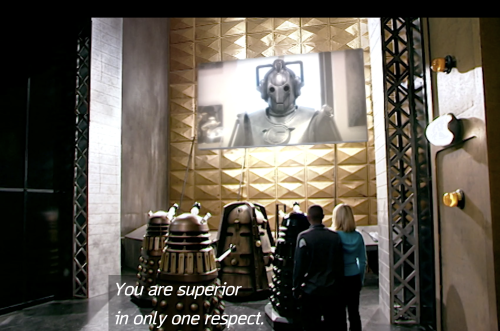

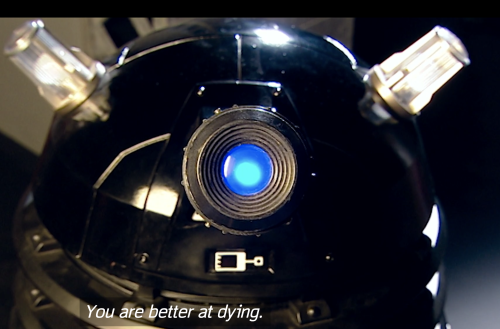
possibly one of the most hilarious exchanges on doctor who
On creating a wiki for your worldbuilding
Do you have a lot of lore to keep track of? Whether you're an author, a Game Master, or simply someone who really really likes worldbuilding, this post is for you.
Here's a quick overview of what I'll be talking about:
Platforms people use to create personal wikis
Formats and organization systems you may find useful when creating your own wiki
A brief look at the actual content you might put in your wiki (I'm planning a more in-depth post on that later with more images and demos)
And because this is gonna be a long'un, I'm putting a read-more here! I'll also make downloadable epub and PDF versions of this post available for free on my Ko-Fi at some point in the future.
(I'm also planning to reblog with a list of links later on, but I want this initial post shows up in search)
Also now that you're here, I'm going to say this isn't, like, super comprehensive or anything. I'm just talking about stuff I know a little about or have experience with. Please feel free to reblog with additions and/or corrections as needed!
What is a wiki?
According to Wikipedia, "a wiki is a hypertext publication collaboratively edited and managed by its own audience, using a web browser."
In this case, you'll likely be the sole person making updates to your wiki. The web browser part is optional these days as well, as you'll soon see.
Platforms for creating wikis
Websites for creating worldbuilding wikis
WorldAnvil
This one is actually designed for people who want to create big worldbuilding wikis.
Pros: Worldbuilding prompts! Those are great. It's got a pretty comprehensive set of article types too.
Cons: Kind of expensive to upgrade for features like making your wiki private, and it does NOT work well with adblock turned on, so if you don't want to pay for a membership you'll get inundated with ads. I'm not a huge fan of the interface in general and a lot of it isn't intuitive, but I like what they're doing so I support them anyway.
---
Tiddlywiki/Tiddlyhost.com.
In addition to having a cat as its icon and also a silly name, each 'article' you create with this is called a 'tiddler' which makes me think of Chuck Tingle. I haven't used it much myself yet, but I did make an account and it seems pretty neat.
---
Miraheze
A community-hosted wiki platform that runs on MediaWiki (which is what Wikipedia runs off of).
Pros: It's not Fandom.com.
Cons: You have to request a wiki and can't just make it yourself, as far as I can tell. I haven't actually looked into this one as much.
---
Neocities
An option for if you want to go super oldschool and create a website using only basic html and hyperlinks (without the handy shortcuts of bbcode or Markdown). Monthly cost is $5 usd if you want to have more space and your own domain.
Pros: 100% control over your content.
Cons: Doesn't support PHP databases for wiki software, and can be fairly labour-intensive to update if you break a link or something.
---
Fandom.com
Unfortunately, this one is the top result you'll get when you look up how to make your own wiki. I'm only including it here to tell you to stay as far away from it as possible!!
Its staff are known to ban wiki creators from their own wikis and a bunch of other nonsense that I'm not getting into here.
Programs and apps/web apps for creating worldbuilding wikis
Obsidian.md
My personal favourite. I'm planning to make a whole post about how I use it in the near future as part of this article series.
It's a markdown-based application that you can get on just about any platform (Windows, MacOS, Linux, iOS, Android, etc) which is great. Obsidian is really easy to pick up and use and also has great themes and community plugins!
Best thing is, it's FREE and you only have to pay if you use their publishing service, which... I don't, so.
---
Notion
I've heard this one is pretty good too. Idk if it costs anything. It's another "second brain" style app (might be markdown also?) and I think it might do more than Obsidian, but I haven't checked it out much myself.
---
Microsoft Word/Google Docs etc.
...Or just about any word processor that lets you create internal hyperlinks. Word may work best due to the collapsible headings so it doesn't get too unwieldy, but *shrug* whatever floats your boat.
---
Excel/Google Sheets etc.
Or, again, any spreadsheet creator that lets you create internal hyperlinks.
I'd recommend having some basic spreadsheet knowledge before doing this. It could get complicated. Before I started using Obsidian, I was using Sheets to keep track of my glossary, notes about characters, and plot ideas.
Types of formatting & organization systems
There are as many organization systems as there are people who want to organize their stuff. Everybody needs something a little different! I find the ones that work best for me are systems that have a lot of customization options.
Here are a couple I know of.
Johnny Decimal
This system is absurdly simple in its concept and yet so versatile. From their website (it's just johnnydecimal dot com but I'll link it in a reblog later):
Take everything you need to organise and sort it in to, at most, ten large buckets.
Make sure the buckets are unambiguously different.
Put a label on each bucket.
Their website has a better explanation than I can give in this post, but I'll sum up the appeal of this system as quoted from their site: "There's only one place anything can ever be."
Usefully, part of this method is creating a directory for the rest of the system.
So if you're like me and tend to shove things wherever only to lose track of it later, this is a great system—especially when used in conjunction with the Zettelkasten Method (see below).
---
Zettelkasten Method
Originally devised as an extensive paper-based knowledge management system, Zettelkasten is meant to easily add new entries to a knowledge base while giving each one a unique ID for easy 'linking.'
The creator of this method said 'it is not important where you place the note, as long as you can link to it.'
As with the Johnny Decimal system, I can't explain it super succinctly (nor can the website, if I'm being honest), so I'll include a link in a future reblog for a video that gave me an excellent run-down of the basics.
Setting up your own system
An organization system is only useful if you can actually, y'know, use it.
It can be fun to set up a super-detailed organization system with predetermined categories for everything, but is it easy for you to use? How will you navigate it?
Making decisions
There will be a lot of decisions to make as you set up your system. The only set-in-stone rule I follow is... don't set anything in stone. It's okay if you decide something that doesn't work later on.
Figuring out your categories
My advice: go fairly broad. You can always sub-categorize. I'm going to go over my own wikis for Athenaeum and Rocket Boosters in detail in a later post, but here are the starting top-level categories I'd recommend for worldbuilders:
A meta category for notes about your database, templates, and any relevant research you've done.
Characters, including main characters, minor characters, and important figures
Worldbuilding
In the last category, which is the main reason for the existence of my wiki, I might have:
Culture
History
Locations
Organizations
Lore (if relevant)
Technology
Transportation
I'll go over the nuances of these 'main' subcategories in that future post I mentioned. In other words, the stuff that actually goes in those categories!
Determining the importance and relevance of worldbuilding elements
You'll need to figure out whether a topic is complex enough to deserve its own entry, or if it should be a sub-heading under another entry. It's okay if you decide on both! I have short subheadings under some entries that amount to "see [link to main entry on that topic]."
I've also decided to expand subheadings into their own topics, and I've removed topics as their own entry and shoved them under subheadings. I do this a lot, in fact! So it's okay if you don't know.
Templates
Will you be creating several of one type of entry?
Individual character profiles
Towns and cities
Factions
(to name a few)
It might be handy to figure out the basic types of information you'll need about each of those things and create a template for them.
A character template might have spaces for the basics, such as name, role, age, and so on.
Some characters will have a lot more information, and some might have even less than what your template dictates! And that's fine.
A word of warning about using system-creation as procrastination
Creating a wiki can be a daunting task. You might decide it's not for you, and that's okay. But you might also decide to go headlong into the process and work on every minute detail, and that is also okay, but.
But.
Beware of using your wiki as an excuse to procrastinate your actual writing/session preparation. Yes, use it to keep track of all the lore you've injected into your manuscript/campaign/whatever, just make sure it stays in its place as a companion to your main project rather than becoming your main project.
How formal should your entries be?
Honestly this one's entirely up to you. I have a mix. Some entries are written like Wikipedia entries with a thorough explanation of the topic with proper punctuation and formatting, while others are simply bullet-point lists of thoughts and ideas that I can return to at a later date.
What methods do you use to keep track of your lore and worldbuilding? Let me know in a reblog or comment!
And please make sure to check the notes. I'll be reblogging with links, and then reblogging that reblog to make sure they're, y'know, actually visible in the notes.
When I started writing fanfiction like ten years ago, dialogue was absolutely my weakest point. And I knew it. Character voice was a struggle, I used more ellipses than words probably, I just tried to lean on narration instead.
Fun to reflect and realize what a 180 I did on that. Cuz frankly dialogue is a DELIGHT and the best part of writing now. I love strong character voices. I love making characters trip over their words and talk over each other and go on tangents and lose their point and snark and snap at each other and crack wise and just, I love thinking about how dialogue sounds, and what feels most organic.
Description and narration are all still well and good, but it’s like those are the framework and scaffolding to set characters up to just say shit. I LOVE making characters just say shit. The truest delight of fanfic.
A Quick Guide to Foreshadowing!
Foreshadowing - a warning or indication of a future event. In literature, it is when an author provides readers with hints or suggestions as to what will happen later in the story.
Foreshadowing can be used to create tension and set expectations as to how the story will play out. Can inspire reader emotions–suspense, unease, curiosity,
Types of Foreshadowing
Chekhov’s Gun The author states something that they want you to be aware of for the future - in the eponymous example, a gun hanging on the wall in an early chapter will be used later.
Prophecy A statement to character/ reader about what will happen in the future. Although sometimes unclear at first, they normally become true by the end.
Symbolism A more abstract way of foreshadowing, often shown through things like objects, animals, images and weather. Often foreshadows change in mood, luck or behaviour.
Flashback/Flashforward When the author needs the reader to know something that happened that doesn’t fit with the current timeline. Often there will be hints/clues for things that the writer wants you to remember/pick up on later.
Red Herring A type of foreshadowing that deliberately misleads the reader. False clues such as a character finding another suspicious, etc., may lead you to believe one thing when, in reality, they will have done nothing wrong
Tips and Tricks for Effective Foreshadowing!
Don’t foreshadow too obviously - signpost rather than state! Arouse suspicion, but keep them guessing!
If you make a promise, keep it!
The bigger the twist, the earlier it should be foreshadowed! Foreshadowing too soon is essentially a spoiler
Keep foreshadowing in moderation
Use beta-readers - sometimes our foreshadowing feels so obvious to us but it may not to other people who aren’t as close!
we always say that writing improves with practice, which is true & good to remind people of, but i think we fail to emphasize that literally every part of your writing will get better with time and effort. sure, your prose will become clearer and more sophisticated, but it’s so much more than that.
you’ll become so much faster, for one thing. if it takes you two weeks to complete a 3k chapter when you start out, you’ll eventually reach a point when you can crank that out in a matter of days. maybe right now your story ideas are like a dripping faucet–slow, random, and occasional. well, the longer you let that faucet run, the more your ideas will start to flow, until suddenly you’re finding inspiration in everything. the length and complexity of your stories will grow too. you might start writing stories in the 2-10k range, but you’ll eventually find that you’re writing 20-30k stories without even really intending to.
of course your style will improve. of course your imagery will become richer. of course your syntax will start to flow better. but there are so many other aspects of the writing process, and literally every single one of them will start getting better too.
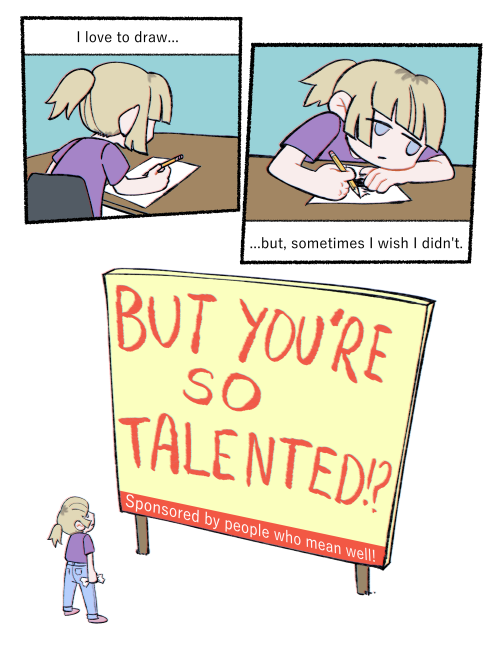
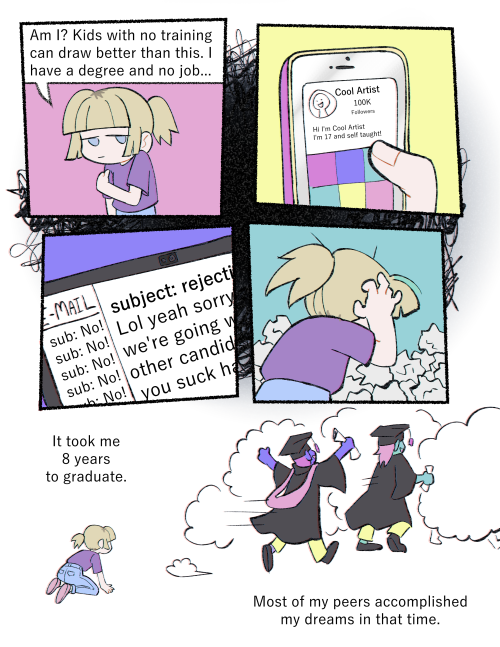

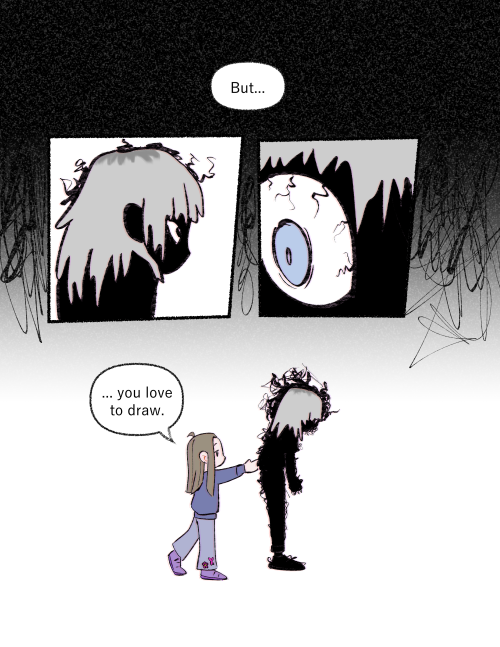
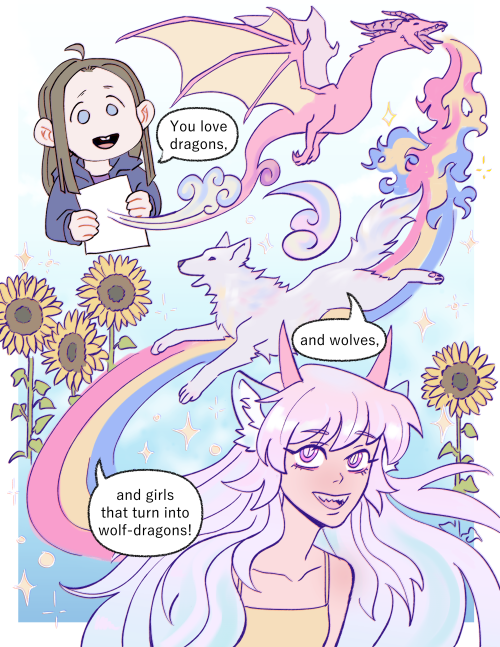
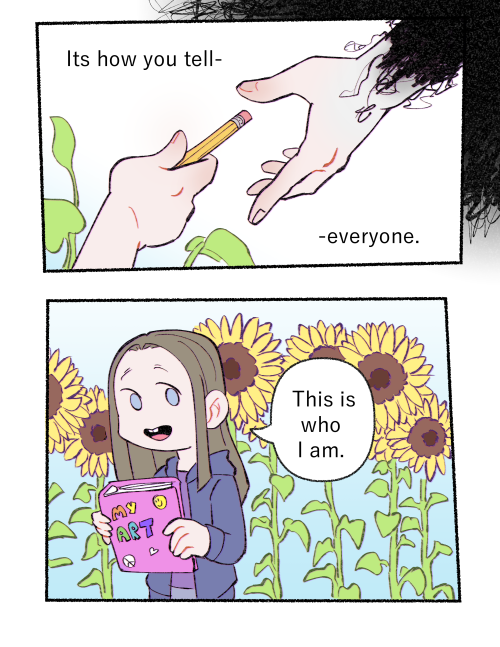

A comic to try and sort through some difficult feelings about being an artist and a reminder to not forget who you are.
It starts in Paris.
“You can’t steal things just because you like them,” Sam tells Bucky, feeling innately that this is a losing battle, and Bucky cocks his head to the side, considers Sam very thoughtfully.
“Really,” he says. “I’m stealing you, aren’t I?”
hello, here is that long painfully slow-burning Sam-centric fic that’s been killing me for the last month. 33.5k words spanning from post-Winter Soldier to… well, to A Time. featuring art theft, meaningful conversation in hotel rooms, burning undercurrents of tension, Steve Rogers being Steve Rogers, moments of softness and breathless stillness. have fun. I’m dead.
I probably shouldn't admit this about something I wrote, but I accidentally re-read Carnivore all the time. I'll open it to look something up to reference in Gripped Tight and then start reading like "oh shit, this was good. oh dang i did that so true of me. oh wow i'd forgotten that part i love that jeez!" lol
-
 phantom-z0ne reblogged this · 1 week ago
phantom-z0ne reblogged this · 1 week ago -
 phantom-z0ne liked this · 1 week ago
phantom-z0ne liked this · 1 week ago -
 blessedbucky liked this · 2 weeks ago
blessedbucky liked this · 2 weeks ago -
 cholenn liked this · 4 weeks ago
cholenn liked this · 4 weeks ago -
 stellula liked this · 1 month ago
stellula liked this · 1 month ago -
 rudimentaryflair reblogged this · 1 month ago
rudimentaryflair reblogged this · 1 month ago -
 justice4glitter reblogged this · 1 month ago
justice4glitter reblogged this · 1 month ago -
 knightknightdannie liked this · 1 month ago
knightknightdannie liked this · 1 month ago -
 cageofbxrds liked this · 1 month ago
cageofbxrds liked this · 1 month ago -
 sunnytheoneandonly liked this · 2 months ago
sunnytheoneandonly liked this · 2 months ago -
 antihell liked this · 2 months ago
antihell liked this · 2 months ago -
 whatsthewhataboutwriting reblogged this · 2 months ago
whatsthewhataboutwriting reblogged this · 2 months ago -
 claireandkaianatural liked this · 3 months ago
claireandkaianatural liked this · 3 months ago -
 kirrarae liked this · 3 months ago
kirrarae liked this · 3 months ago -
 kookytanuki reblogged this · 3 months ago
kookytanuki reblogged this · 3 months ago -
 amourlyns liked this · 3 months ago
amourlyns liked this · 3 months ago -
 bimboemmett reblogged this · 3 months ago
bimboemmett reblogged this · 3 months ago -
 bambin0s reblogged this · 3 months ago
bambin0s reblogged this · 3 months ago -
 hmmmmpotato liked this · 4 months ago
hmmmmpotato liked this · 4 months ago -
 theoneiadore reblogged this · 4 months ago
theoneiadore reblogged this · 4 months ago -
 underratedbreadcrust liked this · 4 months ago
underratedbreadcrust liked this · 4 months ago -
 dxstoeskyvjbess liked this · 4 months ago
dxstoeskyvjbess liked this · 4 months ago -
 lumno-in-limbo liked this · 4 months ago
lumno-in-limbo liked this · 4 months ago -
 cozybrushes reblogged this · 4 months ago
cozybrushes reblogged this · 4 months ago -
 mcsupremacy liked this · 4 months ago
mcsupremacy liked this · 4 months ago -
 iss-chromatica liked this · 5 months ago
iss-chromatica liked this · 5 months ago -
 diluvenimpact reblogged this · 5 months ago
diluvenimpact reblogged this · 5 months ago -
 jellybeanbingus liked this · 5 months ago
jellybeanbingus liked this · 5 months ago -
 the-eldritch-angel liked this · 5 months ago
the-eldritch-angel liked this · 5 months ago -
 fourwinged reblogged this · 5 months ago
fourwinged reblogged this · 5 months ago -
 001139 liked this · 5 months ago
001139 liked this · 5 months ago -
 rudimentaryflair liked this · 5 months ago
rudimentaryflair liked this · 5 months ago -
 mourn000 liked this · 5 months ago
mourn000 liked this · 5 months ago -
 sparkleess liked this · 5 months ago
sparkleess liked this · 5 months ago -
 brattybibi liked this · 6 months ago
brattybibi liked this · 6 months ago -
 asytho-inspo liked this · 6 months ago
asytho-inspo liked this · 6 months ago -
 poetryinhalessharply reblogged this · 6 months ago
poetryinhalessharply reblogged this · 6 months ago -
 missnaomijean-writes reblogged this · 6 months ago
missnaomijean-writes reblogged this · 6 months ago -
 kayinspo reblogged this · 6 months ago
kayinspo reblogged this · 6 months ago -
 ataipaninland liked this · 6 months ago
ataipaninland liked this · 6 months ago -
 colorfulsaccharinecalamity liked this · 6 months ago
colorfulsaccharinecalamity liked this · 6 months ago -
 dionysianrevelry liked this · 6 months ago
dionysianrevelry liked this · 6 months ago -
 hauntedhikingsociety liked this · 6 months ago
hauntedhikingsociety liked this · 6 months ago -
 cocoonnut reblogged this · 6 months ago
cocoonnut reblogged this · 6 months ago -
 butimnotasexyrussian reblogged this · 6 months ago
butimnotasexyrussian reblogged this · 6 months ago -
 agent6v6 liked this · 6 months ago
agent6v6 liked this · 6 months ago -
 rzmus1ngs liked this · 6 months ago
rzmus1ngs liked this · 6 months ago

